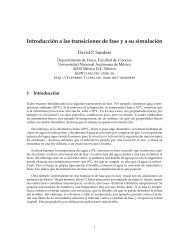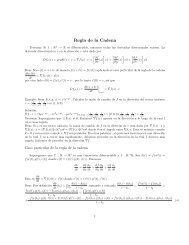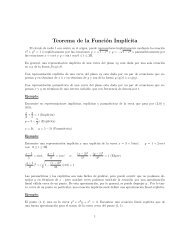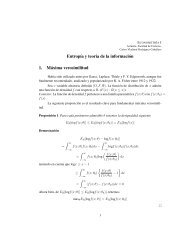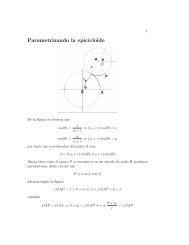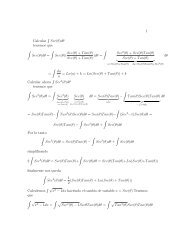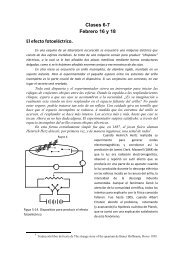"Surely You're Joking, Mr. Feynman!" - unam.
"Surely You're Joking, Mr. Feynman!" - unam.
"Surely You're Joking, Mr. Feynman!" - unam.
You also want an ePaper? Increase the reach of your titles
YUMPU automatically turns print PDFs into web optimized ePapers that Google loves.
elementary things are easy to think about; if you can't think of a new thought, no harm<br />
done; what you thought about it before is good enough for the class. If you do think of<br />
something new, you're rather pleased that you have a new way of looking at it.<br />
The questions of the students are often the source of new research. They often ask<br />
profound questions that I've thought about at times and then given up on, so to speak, for<br />
a while. It wouldn't do me any harm to think about them again and see if I can go any<br />
further now. The students may not be able to see the thing I want to answer, or the<br />
subtleties I want to think about, but they remind me of a problem by asking questions in<br />
the neighborhood of that problem. It's not so easy to remind yourself of these things.<br />
So I find that teaching and the students keep life going, and I would never accept<br />
any position in which somebody has invented a happy situation for me where I don't have<br />
to teach. Never.<br />
But once I was offered such a position.<br />
During the war, when I was still in Los Alamos, Hans Bethe got me this job at<br />
Cornell, for $3700 a year. I got an offer from some other place for more, but I like Bethe,<br />
and I had decided to go to Cornell and wasn't worried about the money. But Bethe was<br />
always watching out for me, and when he found out that others were offering more, he<br />
got Cornell to give me a raise to $4000 even before I started.<br />
Cornell told me that I would be teaching a course in mathematical methods of<br />
physics, and they told me what day I should come November 6, I think, but it sounds<br />
funny that it could be so late in the year. I took the train from Los Alamos to Ithaca, and<br />
spent most of my time writing final reports for the Manhattan Project. I still remember<br />
that it was on the night train from Buffalo to Ithaca that I began to work on my course.<br />
You have to understand the pressures at Los Alamos. You did everything as fast<br />
as you could; everybody worked very, very hard; and everything was finished at the last<br />
minute. So, working out my course on the train a day or two before the first lecture<br />
seemed natural to me.<br />
Mathematical methods of physics was an ideal course for me to teach. It was what<br />
I had done during the war apply mathematics to physics. I knew which methods were<br />
really useful, and which were not. I had lots of experience by that time, working so hard<br />
for four years using mathematical tricks. So I laid out the different subjects in<br />
mathematics and how to deal with them, and I still have the papers the notes I made on<br />
the train.<br />
I got off the train in Ithaca, carrying my heavy suitcase on my shoulder, as usual.<br />
A guy called out, "Want a taxi, sir?"<br />
I had never wanted to take a taxi: I was always a young fella, short on money,<br />
wanting to be my own man. But I thought to myself, "I'm a professor I must be<br />
dignified." So I took my suitcase down from my shoulder and carried it in my hand, and<br />
said, "Yes."<br />
"Where to?" "The hotel." "Which hotel?"<br />
"One of the hotels you've got in Ithaca."<br />
"Have you got a reservation?"<br />
"No."<br />
"It's not so easy to get a room."<br />
"We'll just go from one hotel to another. Stay and wait for me."<br />
I try the Hotel Ithaca: no room. We go over to the Traveller's Hotel: they don't



